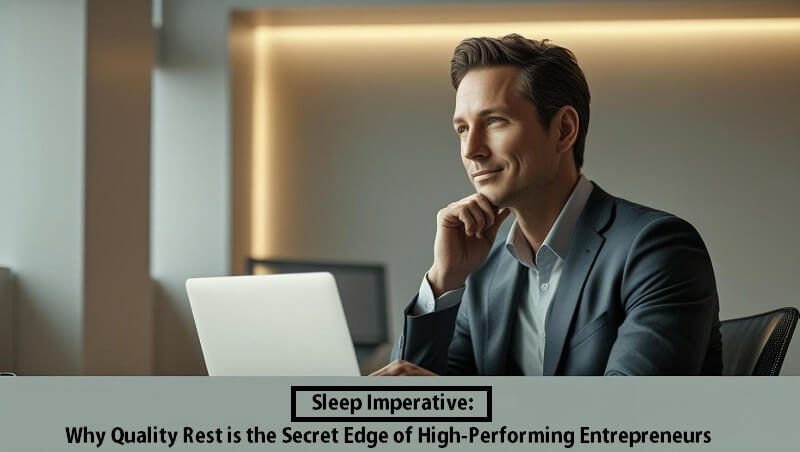The Sleep Imperative: Why Quality Rest is the Secret Edge of High-Performing Entrepreneurs
in Health on July 3, 2025Sleep is often framed as a luxury or a weakness in today’s high-pressure business world. Entrepreneurs boast about four-hour nights like badges of honor. Corporate leaders burn the midnight oil in pursuit of elusive margins. But what if this relentless grind, this sacrifice of rest for productivity, keeps professionals from reaching their highest potential? Science has spoken, and the verdict is clear: quality sleep isn’t a hindrance to business success—it’s one of its most powerful catalysts.

The Productivity Paradox: Why Less Sleep Doesn’t Mean More Work
The modern business ethos idolizes hustle. Late nights, early mornings, and round-the-clock availability are seen as indicators of dedication. However, this productivity culture is built on a flawed assumption: that time spent awake equals output. According to the RAND Corporation, sleep deprivation costs the U.S. economy over $411 billion annually in lost productivity, accidents, and health-related expenses. Far from being a sign of commitment, chronic sleep deprivation erodes operational efficiency, decision-making, and strategic thinking.
Cognitive science supports this. The National Sleep Foundation reports that individuals sleeping fewer than six hours per night experience a 400% increase in mental lapses, negatively impacting attention, memory, and focus. These deficits don’t just harm the sleep-deprived—they cascade through teams, delay critical decisions, and compromise entire projects.
The Science Behind Sleep and Peak Brain Function
Every business leader knows that success requires mental sharpness, creative thinking, and emotional resilience. Sleep is the unsung force behind all of these. During sleep—particularly REM and deep sleep stages—the brain consolidates memory, clears neurotoxic waste, and restores critical neural pathways responsible for innovation and executive function.
A 2023 study published in Nature Neuroscience revealed that even one night of poor sleep can reduce prefrontal cortex activity by 25%, significantly impairing risk assessment and long-term planning. In an entrepreneurial context, this could mean misjudging market trends, underestimating competition, or misallocating capital—errors that could prove catastrophic.
“Sleep isn’t a passive state; it’s a biological investment in high-level cognition,” explains Vladimira Ivanova, Psychologist at The Diamond Rehab Thailand. “When leaders sleep poorly, they become reactive instead of strategic. Emotional regulation drops, anxiety rises, and even minor setbacks feel overwhelming.”
Operational Efficiency Starts at Night
Operational excellence doesn’t begin with technology or talent—it begins with leadership clarity. And clarity requires rest. Teams often mirror the energy of their leaders. If executives are constantly fatigued, irritable, or inconsistent, it trickles down into the organizational culture, causing decision bottlenecks and declining morale.
“Across our logistics teams, we’ve noticed a direct relationship between shift managers’ sleep patterns and incident rates,” shares John Gill, Operations Director at Easy Concrete Supply. “Managers who consistently prioritize rest have 30% fewer coordination errors, maintain higher employee satisfaction, and are better at conflict resolution.”
In industries where uptime is sacred and delays cost millions, the operational ROI of well-rested leadership is significant. It’s not about working harder—it’s about working smarter, and sleep is the gateway.
The Creative Economy Is Powered by Rested Minds
Creativity and innovation are often perceived as spontaneous bursts of genius. But neuroscience suggests otherwise. These processes are tightly linked to sleep, particularly REM sleep, which supports abstract thinking, pattern recognition, and problem-solving. A study in Scientific Reports found that participants who napped showed a 40% improvement in creative tasks compared to those who stayed awake.
For entrepreneurs, whose value lies in vision and originality, sleep is an accelerator. “Every new product idea I’ve developed came after periods of intentional rest,” says Sumeer Kaur, Founder of Lashkaraa.com. “When I used to work late into the night, I’d hit diminishing returns fast. Now, my schedule prioritizes sleep, and my output—both in quality and innovation—has doubled.”
This shift isn’t just personal. Some of the world’s most successful founders, from Jeff Bezos to Arianna Huffington, credit their eight-hour sleep routines as essential to long-term success. In the innovation economy, alertness is currency.
Ergonomics, Technology, and the New Sleep Infrastructure
The global sleep economy—now valued at over $585 billion—reflects a new understanding: quality sleep is no longer incidental, it’s intentional. From blackout curtains to circadian lighting, the workplace is beginning to embrace sleep as an asset.
“Modern entrepreneurs are realizing that investing in ergonomic mattresses, sleep tracking, and environment optimization isn’t indulgent—it’s strategic,” says Martin Seeley, CEO of Mattress Next Day and a leading sleep expert. “Your mattress might be the most undervalued piece of business infrastructure you own. If you’re spending a third of your life sleeping, why would you settle for discomfort and suboptimal posture?”
Sleep technology has also advanced to offer real-time biometric tracking, allowing professionals to align their cognitive peaks with key decision-making windows. From wearable Oura rings to smart home climate control, the business world is waking up to the fact that sleep can—and should—be engineered for performance.
The Long-Term Business ROI of Consistent Sleep
While short-term gains from skipping sleep may feel substantial—one more proposal sent, one more meeting held—the long-term cost is devastating. Chronic sleep deprivation is linked to a risk increase of 200% for cardiovascular disease, a 65% higher chance of burnout, and significant reductions in lifetime earnings due to reduced productivity and increased absenteeism.
Conversely, consistent high-quality sleep can:
- Improve task accuracy by 34%
- Reduce workplace accidents by 50%
- Lower healthcare costs for companies with wellness programs centered on sleep
For executives, this translates into greater clarity in boardrooms, stronger investor confidence, and healthier bottom lines. For entrepreneurs, it’s about sustainable growth, not burnout-fueled sprints.
Actionable Sleep Strategies for Business Professionals
Changing how we view sleep starts with changing our daily habits. Here are science-backed, business-tested sleep strategies:
1. Establish a tech-free wind-down routine: Screens emit blue light, which suppresses melatonin. A 60-minute screen detox before bed improves sleep onset and quality.
2. Invest in sleep ergonomics: From cooling mattresses to supportive pillows, your sleep environment should be as optimized as your office.
3. Align schedules with chronotype: Early birds and night owls operate differently. Align your sleep with your natural rhythm to maximize alertness during work hours.
4. Incorporate micro-naps strategically: A 15–20 minute nap after lunch can restore cognitive energy without impairing nighttime sleep.
5. Use sleep data wisely: Wearables like WHOOP and Fitbit can help monitor sleep stages and recovery, giving insights into your most effective work-sleep balance.
6. Set a ‘CEO bedtime’: Guard your sleep hours like your most important meeting. Set alarms not just for waking, but for winding down.
A New Paradigm: Rest as an Asset, Not a Risk
The idea that successful people sleep less is outdated and dangerous. The new breed of high-performing professionals treats rest as seriously as revenue forecasts. They understand that cognitive clarity, emotional intelligence, and resilience aren’t side effects of sleep—they are its results.
As Vladimira Ivanova puts it: “You can’t scale a business sustainably without scaling your capacity to lead. And that capacity starts—not ends—with a good night’s sleep.”
Ultimately, the most radical business move isn’t staying up late. It’s going to bed on time.
Conclusion
Sleep is no longer the enemy of productivity—it is its engine. By reframing rest as a business strategy, leaders can unlock higher performance, reduce errors, drive innovation, and create a culture of resilience. From the boardroom to the startup garage, the message is clear: prioritizing quality sleep is not a sign of weakness—it’s a mark of wisdom.
Want your next breakthrough? Start by turning off your screen and the lights. Your brain, your business, and your bottom line will thank you in the morning.
Also, you can check: Wellhealthorganic.com : Morning Coffee Tips With No Side Effect.







